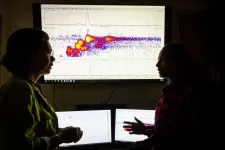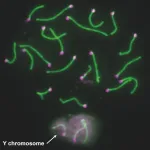(Press-News.org) Researchers at Rutgers University have found that adverse childhood experiences can make people more sensitive to potential threats from others, which in turn increases their risk of engaging in defensive gun use in adulthood.
Their study, published in the Journal of Psychiatric Research, used cross-sectional data from a subsample of 3,130 adults with firearm access drawn from a nationally representative sample of U.S. adults.
Those surveyed were asked about their childhood experiences with abuse and neglect, their levels of social distrust and sensitivity to perceived threats, depressive symptoms and their self-reported use of a gun for self-defense.
The authors first assessed the association between adverse childhood experiences and adulthood defensive gun use. They then evaluated the role of depressive symptoms and threat sensitivity in that relationship.
“Research that links risk factors from childhood to problems later in life often neglects the role that situational and cognitive factors might play,” said Sultan Altikriti, a postdoctoral fellow at the New Jersey Gun Violence Research Center and lead author of the study. “We tried to unpack the cognitive factors through which experiences from childhood affect behavior in adulthood.”
The findings showed that adverse childhood experiences increased adulthood levels of threat sensitivity and depression. However, only threat sensitivity was associated with defensive gun use. Further analyses suggested evidence that threat sensitivity accounts for some of the increased risk of defensive gun use among those with adverse childhood experiences.
“Sensitivity to threats from others and hypervigilance can cause people to see threats where they do not exist,” said Altikriti. “This sense of threat sensitivity can then lead to overreactions in neutral or ambiguous situations, which might lead to unnecessary gun use.”
Reducing adverse childhood experiences not only reduces the immediate harm and psychological impact but can reduce the cumulative harm throughout someone’s life, the researchers said. They added that because adverse childhood experiences are fixed in childhood and adolescence, interventions that interrupt the downstream mechanisms could be more feasible in dealing with the impact of these experiences on negative life outcomes.
The study’s coauthors include Daniel C. Semenza, director of Interpersonal Violence Research at the New Jersey Gun Violence Research Center at the Rutgers School of Public Health; Michael D. Anestis, executive director of the New Jersey Gun Violence Research Center at Rutgers; Alexander Testa, an assistant professor at the University of Texas Health Science Center at Houston; Dylan B. Jackson, an associate professor at the Johns Hopkins Bloomberg School of Public Health.
END
Adverse childhood experiences influence potentially dangerous firearm-related behavior in adulthood
2025-01-23
ELSE PRESS RELEASES FROM THIS DATE:
Bacteria found to eat forever chemicals — and even some of their toxic byproducts
2025-01-23
BUFFALO, N.Y. — In the quest to take the “forever” out of “forever chemicals,” bacteria might be our ally.
Most remediation of per- and polyfluoroalkyl substances (PFAS) involves adsorbing and trapping them, but certain microbes can actually break apart the strong chemical bonds that allow these chemicals to persist for so long in the environment.
Now, a University at Buffalo-led team has identified a strain of bacteria that can break down and transform at least three types of PFAS, and, perhaps even more crucially, some of ...
London cabbies’ planning strategies could help inform future of AI
2025-01-23
Researchers have measured the thinking time of London taxi drivers - famous for their knowledge of more than 26,000 streets across the city - as part of a study into the future of AI route-mapping.
Unlike a satnav, which calculates every possible route until it gets to the destination, researchers at the University of York, in collaboration with University College London and the Champalimaud Foundation, found that London taxi drivers rationally plan each route by prioritising the most challenging areas first and filling in the rest of the route around these tricky points.
Current computational models to understand ...
More acidic oceans may affect the sex of oysters
2025-01-23
Rising carbon dioxide levels affect more than just the climate; they also affect the chemistry of the oceans. When saltwater absorbs carbon dioxide, it becomes acidic, which alters the aquatic animal ecosystem. But how exactly does ocean acidification impact animals whose genetic makeup can shift depending on environmental cues? A study published in ACS’ Environmental Science & Technology addresses this question through the “eyes” of oysters.
Oysters, unlike mammals and birds, do not have chromosomes that dictate their sex at the ...
Transportation insecurity in Detroit and beyond
2025-01-23
Images
More than a third of Detroit residents (36%) can't get from place to place in a safe or timely manner.
This is the main finding of a new study led by Alexandra Murphy, associate director of social science research at Mcity and assistant research scientist at U-M's Poverty Solutions, and first author Lydia Wileden, a U-M alum and assistant research professor at the University of Connecticut.
They measured this with a tool created by Murphy and her team called the Transportation Security ...
New tool enables phylogenomic analyses of entire genomes
2025-01-23
Researchers led by electrical engineers at the University of California San Diego have developed a better way to perform the comparative analysis of entire genomes. This approach can be used to study relationships between different species across geological time scales.
This new approach is poised to unlock discoveries regarding how evolution has shaped present-day genomes and also how the tree of life is organized. The new method, named CASTER, is described in a paper published in Science on 23 January 2025.
CASTER ...
Uncovering the role of Y chromosome genes in male fertility in mice
2025-01-23
Researchers at the Crick have uncovered which genes on the Y chromosome regulate the development of sperm and impact fertility in male mice. This research could help us understand why some men don’t produce enough sperm and are infertile.
Males typically have one copy of the Y chromosome and one copy of the X chromosome, whereas females typically have two X chromosomes. Scientists know that the Y chromosome is essential for male fertility, but which genes are the most important and how they work is less clear.
In research published today in Science, a research team at the Crick resolved this question by generating thirteen different ...
A single gene underlies male mating morphs in ruff sandpipers
2025-01-23
Male ruff sandpipers engaging in the act of mating typically fall into one of three groups, with variations in how aggressive they are and how showy their plumage is, among other factors. Now, a new study reports a single gene – HSD17B2 – drives these dramatic differences among male ruff sandpiper morphs. The findings show how evolutionary changes in a single gene's structure, sequence, and regulation can drive significant diversity within a single species. The androgen testosterone plays a key role in male reproductive development. It influences ...
Presenting CASTER – a novel method for evolutionary research
2025-01-23
In a new study involving whole-genome data, researchers present “CASTER,” a tool that uses arrangements in DNA sequences known as site patterns to infer “species trees,” which are diagrams that depict the evolutionary relationships among species. The tool, which performs with exceptional accuracy and scalability and overcomes the limitations of traditional phylogenetic methods, offers transformative potential for evolutionary research. The growing availability of genomic data has revitalized efforts to construct precise species trees and model gene tree variations. However, the methodology for utilizing genome-wide data lags behind data availability. While traditional ...
Reforestation boosts biodiversity, while other land-based climate mitigation strategies fall short
2025-01-23
Reforestation is a win-win for climate and wildlife, but large-scale afforestation and bioenergy cropping may do more harm than good, according to a new study of land-based climate mitigation strategies (LBMS) for over 14,000 species. The findings emphasize the need to ensure well-intentioned climate action does not exacerbate biodiversity loss. While reducing greenhouse gas emissions is critical, increasing atmospheric carbon removal is equally essential to effectively combat climate change. LBMS considered among the most scalable ...
Seasonal vertical migrations limit role of krill in deep-ocean carbon storage
2025-01-23
The vertical migration of Antarctic krill may play a smaller role in oceanic carbon storage than previously believed, according to a year-long study in the Southern Ocean. The findings challenge conventional assumptions about the animal’s role in deep ocean carbon sequestration and underscore the need for more nuanced biogeochemical models incorporating ecological complexity. “Antarctic krill play an important role in the biological carbon pump, but without observational data, we risk using inaccurate and misleading assumptions about behaviors that influence carbon export and ...

